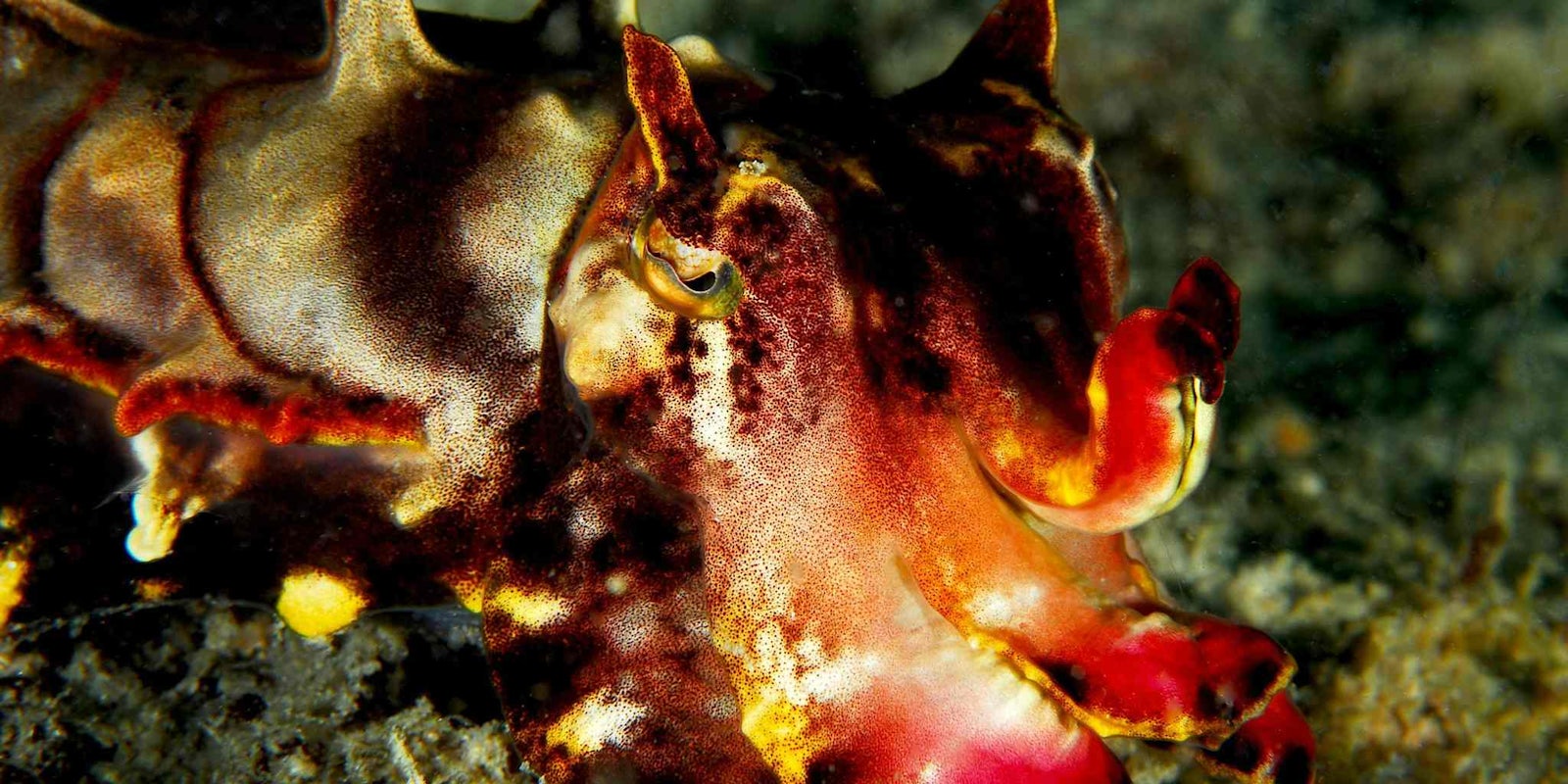Beloved long-running NPR show, Science Friday is celebrating the second annual Cephalopod Week this week.
What’s Cephalopod Week you ask? It’s like Discovery Channel’s Shark Week, only better in almost every way.
Mainly Cephalopod Week trumps Shark Week because of its content. You’re not going to see any fantastical fake-documentaries about finding ancient beasts like “Megalodon: The Monster Shark That Lives” or shows overblowing the aggressiveness of sharks towards humans. Cephalopod Week is all about sharing knowledge and education, you know, like how Shark Week used to be.
What are cephalopods?
Cephalopods include octopuses, squid, cuttlefish, and nautilus. Part of the phylum mollusca, they are closely related to clams and snails. Their name means “head foot,” because their heads sit on top of their feet (commonly referred to as tentacles, but there is a difference between the tentacles and arms of a cephalopod.) With the exception of the nautilus, all cephalopods lack an external shell and posses the ability to change the color, pattern, and even texture of their skin.
Cephalopods are also highly intelligent, but in ways that are totally different from the intelligence of vertebrates like mammals and birds. Cephalopods have donut shaped brains that encircle their esophagus, and the octopus has a mini-brain for each of its arms. They can also perceive color through their skin.
Why do they deserve their own week?
Cephalopods are nothing short of fascinating. Take this “True Facts” video about the cuttlefish, for example:
From the mysterious deep-sea dwelling vampire and giant squids, to the more familiar yet still curious flamboyant cuttlefish and giant pacific octopus, cephalopods have an amazing diversity that is nothing short of beguiling.
Perhaps everyone’s favorite cephalopod feature is their incredible camouflage skills.
On their Cephalopod Week Tumblr page, Science Friday says it got the idea to give Cephalopods their own week when the staff produced this video last year all about cephalopod camouflage.
Cephalopod Week could just as easily be full of misinformation and pseudoscience as Shark Week, if it wanted to be. Cephalopods can be just as terrifying as sharks, with the giant and colossal squids lurking in the depths. Indeed, history is full of accounts of large, tentacled monsters called Krakens tearing down whole ships and devouring entire crews. They’re such an intriguing part of seafaring lore that there’s even a rum named after them.
Instead, we choose to be fascinated by these creatures rather than terrified of them. We write about what we know about the elusive giant squid. We publish articles about how the vampire squid’s scientific name, Vampyroteuthis infernalis, which means “vampire squid from hell,” is actually a misnomer. We explain how awesome cuttlefish are. We pay homage to the weirdo strawberry squid. Maybe that’s because unlike sharks, cephalopods don’t kill anyone. But sharks kill very few people and are also facing far more threats from humans than cephalopods are.
Shark week hurts sharks
If you’ve tuned into Shark Week in recent years, you’ll know how most of the programming is devoted to the shark’s role as a maneater. You’ll either see show after show with shark bite victims telling their harrowing stories, or you’ll watch a program about how sharks are designed for killing.
And while sharks truly are exquisitely constructed predators, humans present a greater danger to sharks than sharks do to humans.
All over the world, fishermen catch sharks, slice their fins off, and dump them back into the water dead or dying. The purpose is to use their fins in shark fin soup, considered a delicacy in several countries in Asia. Shark oils are also considered to have medicinal properties. But most shark fishing is unregulated. Even if it is illegal, it is easy for finning to go unnoticed by officials.
Without sharks, though, ocean ecosystems would collapse. Top predators are important in food chains because they help keep a balance of predators and prey down the line. Without them, some animals may proliferate and throw the ecosystem out of balance.
Discovery Channel squanders a chance to spread awareness of the threatened status of sharks every year, opting instead to portray sharks as maneaters and killers while giving secondary lip service to conservation.
Maybe because it primarily takes place online instead of on TV, Cephalopod Week can be more educational than entertaining. But hopefully this year when Shark Week airs on July 5, we’ll see a different side of Discovery Channel—one that looks more like the scientifically focused Shark Weeks from years ago. Until then, we can only hope they learn something from Cephalopod Week.
Image via Jenny Huang/Wikimedia (CC BY 2.0)


